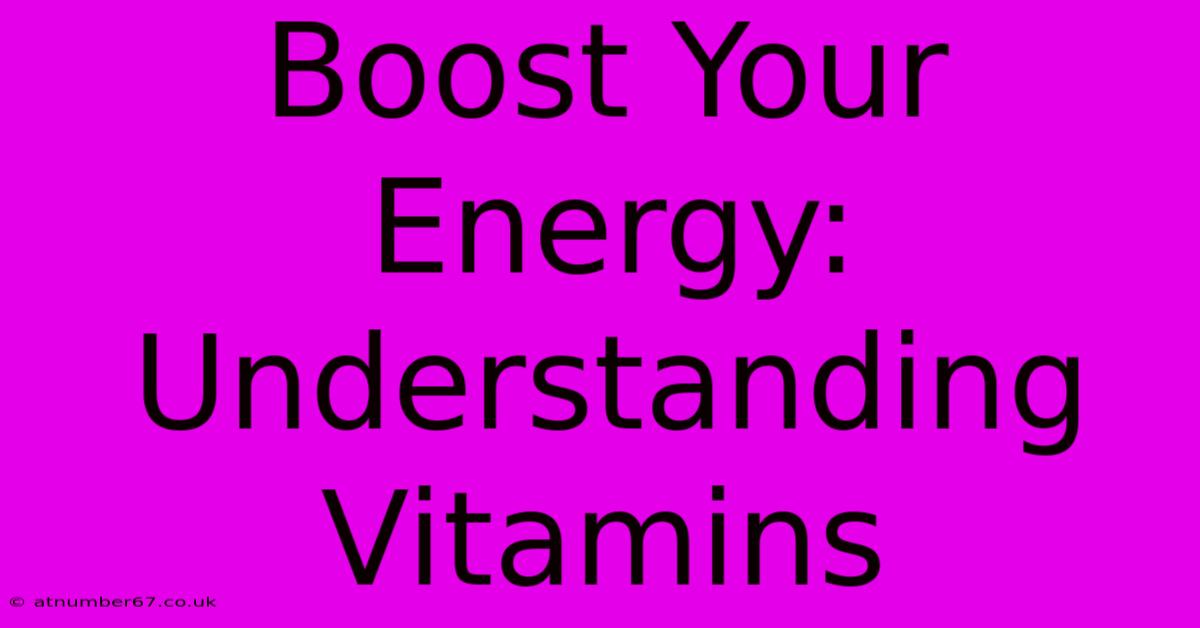Boost Your Energy: Understanding Vitamins

Table of Contents
Boost Your Energy: Understanding Vitamins
Feeling sluggish and low on energy? Before reaching for another cup of coffee, consider the power of vitamins. Vitamins are essential micronutrients that play a crucial role in countless bodily functions, including energy production. A deficiency in even one key vitamin can significantly impact your energy levels and overall well-being. This comprehensive guide will explore the vital role of vitamins in boosting your energy, highlighting key players and how to incorporate them into your diet.
The Energy-Boosting Power of Vitamins
Vitamins don't directly produce energy like carbohydrates or fats. Instead, they act as cofactors, assisting enzymes in the metabolic processes that convert food into usable energy. Think of them as the essential tools your body needs to efficiently generate power. Without these tools, the energy production process slows down, leaving you feeling tired and drained.
Key Vitamins for Energy Production:
-
Vitamin B1 (Thiamine): Crucial for carbohydrate metabolism, converting carbohydrates into energy. A deficiency can lead to fatigue, weakness, and neurological problems. Good sources include pork, legumes, and whole grains.
-
Vitamin B2 (Riboflavin): Plays a vital role in energy metabolism, particularly in the breakdown of fats and proteins. Symptoms of deficiency include fatigue, mouth sores, and skin problems. Found in dairy products, eggs, and leafy green vegetables.
-
Vitamin B3 (Niacin): Essential for cellular respiration, the process that produces energy from food. Deficiency can cause fatigue, skin rashes, and digestive issues. Good sources include meat, poultry, fish, and legumes.
-
Vitamin B5 (Pantothenic Acid): Involved in the metabolism of carbohydrates, fats, and proteins. Deficiency is rare but can cause fatigue, weakness, and digestive problems. Widely distributed in foods, including meat, poultry, eggs, and whole grains.
-
Vitamin B6 (Pyridoxine): Essential for red blood cell formation and neurotransmitter production. Plays a key role in energy metabolism. Deficiency can lead to fatigue, anemia, and neurological issues. Found in bananas, chickpeas, and tuna.
-
Vitamin B12 (Cobalamin): Crucial for red blood cell formation and nerve function. Essential for energy metabolism. Deficiency, common in vegetarians and vegans, can cause fatigue, anemia, and neurological problems. Found in animal products like meat, poultry, fish, and dairy.
-
Vitamin C (Ascorbic Acid): While not directly involved in energy production, Vitamin C acts as an antioxidant, protecting cells from damage and improving the efficiency of energy metabolism. Deficiency can lead to fatigue, weakness, and susceptibility to infections. Found in citrus fruits, berries, and leafy green vegetables.
Beyond Vitamins: A Holistic Approach to Energy
While vitamins are essential, it's crucial to remember that energy levels are influenced by many factors beyond nutrition. A holistic approach is vital for sustained energy:
-
Balanced Diet: Focus on a diverse range of nutrient-rich foods, including whole grains, fruits, vegetables, lean proteins, and healthy fats.
-
Hydration: Dehydration can significantly impact energy levels. Drink plenty of water throughout the day.
-
Regular Exercise: Regular physical activity boosts energy levels in the long run, although initially it might seem to deplete them.
-
Sufficient Sleep: Aim for 7-9 hours of quality sleep per night to allow your body to repair and recharge.
-
Stress Management: Chronic stress can drain energy. Incorporate stress-reducing techniques like meditation, yoga, or spending time in nature.
Getting Enough Vitamins: Food First!
The best way to ensure you're getting enough vitamins is through a balanced and varied diet. However, some individuals may benefit from supplementation, especially if they have specific dietary restrictions or underlying health conditions. Always consult with a healthcare professional before starting any vitamin supplements. They can assess your individual needs and recommend appropriate dosages.
Conclusion: Fuel Your Body for Optimal Energy
By understanding the role of vitamins in energy production and adopting a holistic approach to wellness, you can significantly boost your energy levels and improve your overall health. Remember, a healthy diet, regular exercise, adequate sleep, and stress management are just as important as getting enough vitamins. Fuel your body right, and experience the difference!

Thank you for visiting our website wich cover about Boost Your Energy: Understanding Vitamins. We hope the information provided has been useful to you. Feel free to contact us if you have any questions or need further assistance. See you next time and dont miss to bookmark.
Featured Posts
-
Ayden Heaven Age The Shocking Truth
Apr 04, 2025
-
Brian Littrells Son A Private Life Public Admiration
Apr 04, 2025
-
Meghan Markle Age And Her Commitment To Charity
Apr 04, 2025
-
The Rise And Fall And Rise Of Ben Afflecks Net Worth
Apr 04, 2025
-
What Is Brian Littrells Net Worth The Answer Here
Apr 04, 2025
